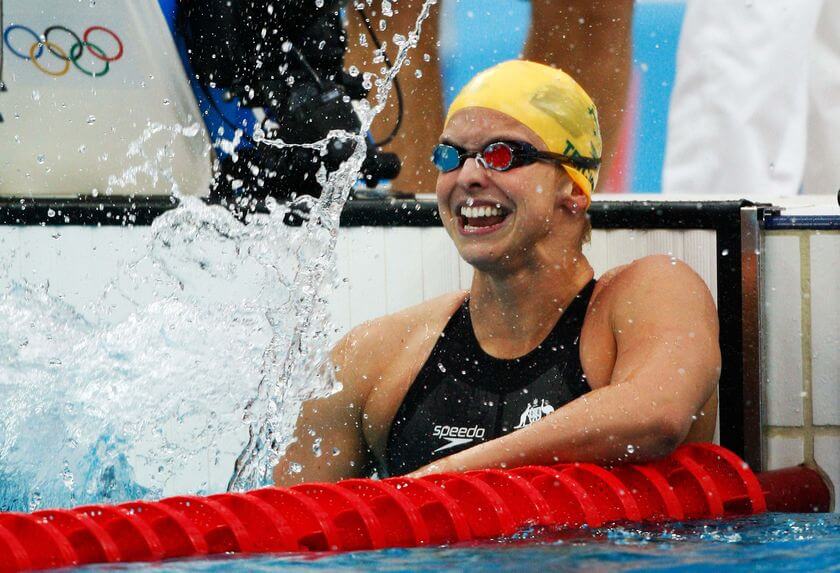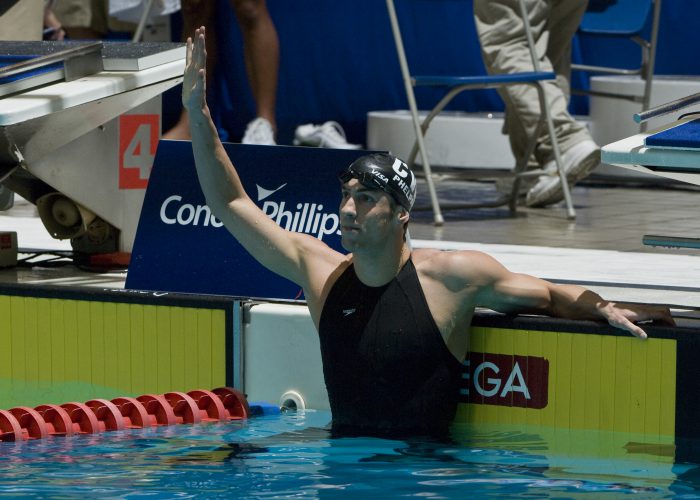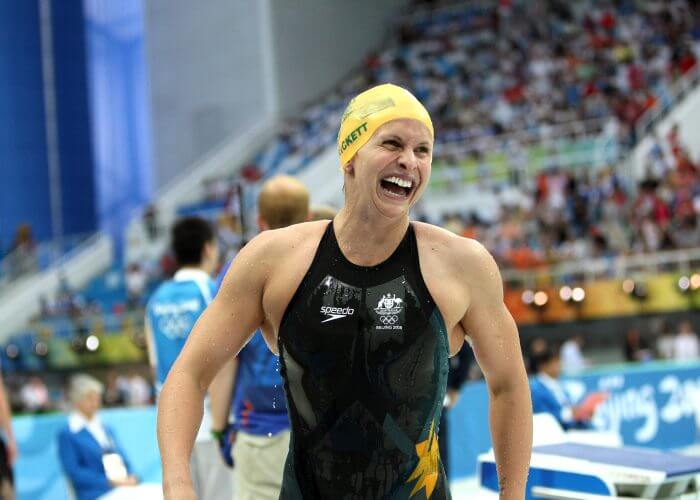Flashback Friday: When Libby Lenton Became ‘The First Woman to Break 53 Seconds’ Over 100 Freestyle

Libby Lenton (Trickett) controversially broke the world record in the 100 freestyle at the 2007 Duel in the Pool, breaking 53 seconds for the first time.
With no swimming going on for the foreseeable future, Swimming World wanted to take a trip down memory lane and re-visit some influential races in swimming history. This week’s race will be the mixed freestyle relay at the 2007 Duel in the Pool in Sydney, Australia.
The year 2007 was a relatively odd one in swimming circles. The World Championships took place in March, and it caused a lot of shifting around of the normal swimming calendar with the NCAA championships having to be moved a couple weeks before their usual slot in late March. With World Championships being so early in the year, that left a “dull” summer with no global international competition to close out the summer before starting the 12-month journey to the Beijing Olympic Games.
The World Championships were hosted in Melbourne, Australia, and it was a huge coming-out party for American superstar Michael Phelps. This was a test run for his program that he would have a year later at the 2008 Olympic Games where he would go on to win an unprecedented eight gold medals in China. Phelps set four individual world records and won seven overall gold medals across those eight days in Melbourne. (A false start in the heats of the 4×100 medley relay robbed a pretty-much-guaranteed gold in that event).
On the women’s side, Australian darling Libby Lenton won three individual gold medals in the 50 and 100 freestyle and 100 butterfly, and also won two relay golds in front of the home Melbourne crowd. Although Laure Manaudou was crowned as world swimmer of the year by this publication, Lenton was arguably the swimmer of the meet at those World Championships because of what she meant to the Australian crowd.
A few days after the World Championships in Melbourne, the U.S. and Australian teams flew the short hour and a half flight to Sydney to perform in the third Duel in the Pool at the 2000 Olympic pool.
The first event of the meet would be the mixed 4×100 freestyle relay, where two men and two women would make one relay team to face off against each other. The mixed relay was a foreign event to the coaches and to the swimmers, evident by the way the coaches ordered their relays. The United States elected to put their men on the lead-off and the anchor, in classic freestyle relay fashion. Michael Phelps was set to lead-off with Kara Lynn Joyce and Lacey Nymeyer, on their third taper meet, going second and third, with Jason Lezak anchoring.
Australia elected to back-load their relay with their superstar duo of Libby Lenton and Jodie Henry on the lead-off, and then Eamon Sullivan and Kenrick Monk anchoring. Whether this was intentional or not, the staffs pitted Phelps and Lenton against each other after they were the faces of the Championships the week before in Melbourne. Now as sort of an encore performance, the two were going to face off against each other in this odd event that no one really knew how to react to.
The Race

Many credited Lenton’s world record to her ability to draft off of Michael Phelps in becoming the first woman to break 53 seconds in the 100 freestyle. Photo Courtesy: Peter H. Bick
Libby Lenton and Michael Phelps matched up against each other on the first leg in what was a unique sight for all swimming fans: Phelps, standing at 6-4 up against Lenton at 5-6. They were two of the biggest names in the swimming universe that year and had a lot of hype around them ahead of the next year’s Olympic Games. So it was fitting that those would two would be leading off their respective country’s relays in this ISL-type duel meet.
The mixed relay was a fun atmosphere captured in the video as Lenton walks up to the blocks, knowing she is completely over-matched against Phelps. Nonetheless, this was a race, and both knew how to step up and perform in the moment.
Phelps swam a solid lead-off leg with a 48.72, handing over to Joyce, who was coming off her senior year NCAAs and World Championships in a three-week span. The cameras did not capture Lenton’s last five meters, but you can see by the reaction of the Australian team — and even some of the American coaches — that Lenton had put up an impressive time. And the NBC commentators took notice: Lenton became the first woman to break 53 seconds in the 100 freestyle from a flat start with her 52.99. At the time, the world record was held by Germany’s Britta Steffen at 53.30 set in 2006. Lenton won the 100 freestyle gold medal the week before at 53.40.
She handed over to former wold record holder and reigning Olympic champ Henry who had to dig deep to close the gap on Joyce.
But the rest of the race seemed to take a back seat to Lenton’s lead-off. Before this race, no one was thinking of a world record. Both teams had gone through a grueling eight day program and Phelps and Lenton especially, were in the water racing nearly every session. The Duel in the Pool was a lot like a precursor to what the ISL is now, a fun meet that is based on strictly racing and scoring points. Times don’t seem to matter (and yet they still put a clock on all the races) and this is all about showcasing the best athletes from the two best swimming nations a week after a great World Championships.
Ultimately, Australia pulled away on the second half with Monk pulling away from Lezak on the anchor leg. There was a particularly humorous line from Rowdy Gaines that hasn’t aged well, where he said as Lezak dove in two and a half seconds behind: “I just don’t think Lezak can make that body and a half lead up” — which is funny knowing what happened the next year in Beijing with Lezak chasing down France for the gold medal.
Australia won with a 3:23.41 ahead of the United States at 3:25.80, and Lenton’s world record was left up in the air.
Aftermath

Libby Trickett broke the 100 freestyle world record officially in 2008. Photo Courtesy: Swimming World Archive
There were questions over whether Libby Lenton’s world record would officially count since the mixed freestyle relay was not a FINA recognized event.
Many in the swimming community felt it was unfair to set a record by swimming in the same race as a male, saying that she swam faster by drafting off Phelps.
Later on April 26, 2007, FINA Executive Director Cornel Marculescu contacted Swimming Australia Limited CEO Glenn Tasker with the news and quoted FINA rules GR 9.6.1.2.
“This event is not included in the FINA rules GR 9.6.1.2 and consequently this relay is not a FINA event and the World Record can not be approved.” Marculescu said at the time.
The rule, in effect, meant the record could not be confirmed because the mixed 4x100m freestyle relay was not an approved FINA event.
On May 13, 2007, Lenton hired lawyer Tony O’Reilly to try and get FINA’s decision overturned so she could be recognized as the official world record holder in the 100 freestyle. She also found out on May 1 that she would not be receiving a financial bonus of $20,000 from event sponsor Fujitsu for breaking a world record in the meet.
Lenton said at the time, “I am a little disappointed because I know in my heart what time I swam, and that time is faster than the existing world record. However, I now know I am capable of swimming under 53 seconds, and I will continue to strive to improve every aspect of my swimming.”
The world record dispute overshadowed the meet itself, in which the United States defeated Australia, 181.5 to 129.5.
Ultimately, Libby Lenton got her revenge. A year later at the 2008 Olympic Trials, she officially broke the world record with a 52.88 under her married name Libby Trickett. But at the Olympic Games later that year in Beijing, it was actually Steffen who came out on top in the 100 freestyle final ahead of Trickett with the silver. Steffen would go on to break the 100 freestyle world record four more times, with all of them occurring in 2009. Trickett and Steffen were inducted into the International Swimming Hall of Fame in 2018 and 2019 respectively.
The mixed relays officially became FINA approved events in 2013, and they made their debut at the world long course championships in 2015. The mixed medley relay will make its debut at the Olympic Games in 2021 in a race where strategy will play an all-important role. Australia’s 3:23 at the 2007 Duel would have been fourth at the World Championships 10 years later in 2017, and actually swam faster than their team that year in Budapest.



